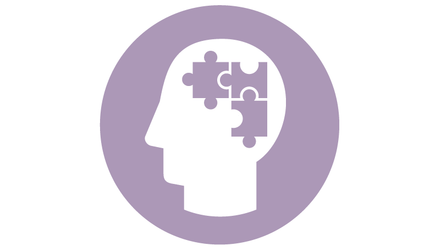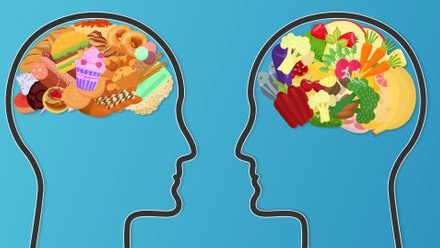Historically, physical and mental health have been treated separately (MHF, 2022) but there is a close relationship between the two.
With one-in-four people experiencing a mental health (MH) difficulty annually and one-in-six weekly (McManus et al., 2009: McManus et al., 2016), it is probable that dietitians working in any setting will encounter patients with a range of psychological presentations. As dietitians work with patients who experience long-term conditions such as obesity, diabetes and heart disease which show a strong association with the presence of MH comorbidities (Barnett et al., 2012), this likelihood is further increased.
Despite this, UK dietitians often receive limited education or practice-based learning (PBL) in MH. Evidence shows that education can be valuable in challenging MH stigma (Nguyen et al., 2012) and can increase health professionals’ confidence when working with individuals with MH diagnoses (Thongpriwan et al., 2015). Further, Health Education England is calling for increased diversity within PBL and has highlighted the benefits of MH and learning disability (LD) PBL for AHP learners (HEE, 2022). This is of particular interest for the dietetic profession with increasing numbers of dietetic roles being established within MH, LD and eating disorders (ED).
With this in mind, we spoke to dietetic learners who were undertaking PBL with MH, ED and/or LD to hear about their experience.
MH and LD PBL enabled learners to develop dietetic skills and competencies across a variety of settings, assessing and supporting patients with a range of clinical conditions in a supportive multidisciplinary environment. Like other clinical services, MH and LD services typically offer care across inpatient wards, day centres, outpatient clinics, home visits and telehealth interventions. Dietetic learners might expect to support people with diagnoses such as anxiety, autism, bipolar disorder, dementia, depression, drug and/or alcohol problems, eating disorders, learning disabilities, neurological conditions, personality disorders, and schizophrenia. As it is well established that those living with severe mental illness are disproportionately affected by long-term physical conditions, dietetic learners are required to utilise knowledge and skills in the dietetic management of physical comorbidities while understanding the bidirectional relationship between mental health and nutritional status. This offered learners an excellent appreciation of the need for holistic assessment and intervention. Our dietetic learners told us that they “enjoyed this variety in clinical conditions and settings as well as having the opportunity to work with patients over the entire duration of PBL”, with many patients requiring longer-term interventions.
Dietetic learners also told us of the benefits of working within “a welcoming and supportive multidisciplinary team”. To meet the physical, mental and social needs of patients within MH and LD services, a multi-disciplinary approach is often needed. Patients may receive care from a range of professionals, including AHP, nursing, psychology and psychiatry. This allowed learners an excellent interprofessional learning opportunity within a supportive environment, particularly helpful if prior knowledge of a specialist area is limited.
Our dietetic learners told us that “while no two days were the same, this could bring challenges, particularly where communication, dietary and medical needs were complex and different”. It is important for those offering MH and LD PBL to acknowledge that a need to learn and adapt to the differing needs of different patient groups can feel overwhelming. As such, while exposure to lots of different specialisms can be interesting, continuity within PBL is helpful; for example, holding a regular weekly clinic and/or ward session throughout the duration of PBL. This can support the learner to build confidence and more easily measure progress while building rapport with patients and multidisciplinary colleagues.
| BENEFITS OF MH AND LD PBL | CHALLENGES OF MH AND LD PBL | SUGGESTIONS FOR MH AND LD PBL PROVIDERS |
| An opportunity to support patients with a variety of mental and physical health conditions | It can be difficult learning and adapting to the different needs of a variety of patient groups | Offer continuity within timetables with regular clinical slots |
| Likely to experience dietetics across a range of settings | Learners felt that patients may be more likely to decline their participation | Provide learners with a ‘welcome pack’ ahead of PBL, outlining conditions, dietetic needs and dietetic interventions that they are likely to experience |
| Opportunities to build rapport with patients who are receiving longer term interventions | Learners may feel they lack the required advanced communication and counselling skills | ‘Scaffold’ learners in the earlier stages of PBL. Remember they may have minimal prior knowledge and experience of conditions |
| Lots of multidisciplinary working and opportunities for interprofessional learning within a supportive environment | Learners are unlikely to have significant prior knowledge of mental health dietetics | Consider developing a patient leaflet explaining the role of dietetic learners within the service as well as the patients right to decline participation |
| Opportunity to develop advanced communication and behaviour change skills | Offer learners transparency that MH and LD PBL have similarities and differences with acute PBL | |
| Ensure learners have regular supervision which extends beyond assessing competency |
All patients have the right to decline dietetic learner participation. Some learners felt that patients may be more likely to decline their involvement and the number of clinical contacts may be less than in an acute setting. Providers can remind learners that no two PBL experiences are the same, and where some settings may offer fewer patient contacts, there are plentiful opportunities for quality communications, often with longer and more frequent sessions. Service providers may also opt to create a patient leaflet explaining the role of dietetic learners within their service, to alleviate patient concerns that may lead them to decline learner participation within their care.
When supporting people with MH and/or LD diagnoses, dietetic learners sometimes “felt they lacked counselling or advanced communication skills that MH and LD specialist dietitians built throughout their career”. They also told us of the challenges in supporting patients with multiple physical and mental health morbidity, how to prioritise dietetic need and establishing an appropriate pace of change. For example, if a person is hospitalised due to an acute psychosis and has poorly controlled type 2 diabetes, dietary management of their physical health may be more difficult where the person is acutely mentally unwell. Learners also noted challenges where mental and physical health risk is high, such as supporting people with eating disorders. Utilising the BDA Nutrition and Dietetic Process is one way to structure learning experiences (British Dietetic Association, 2021). This could be by beginning with identifying the nutritional need and undertaking a dietetic assessment, before progressing to constructing a nutrition and dietetic diagnosis, planning an intervention and implementing and evaluating an intervention.
Dietetic learners within MH and LD PBL should be offered regular support and supervision, not only to aid learning and development but to ensure they are receiving adequate pastoral support. Our dietetic learners noted “the emotive challenges of supporting patients who are presenting with distressing symptomology”. It is imperative that learners are supported to reflect upon difficult consultations, and discussions around learner and staff wellbeing are normalised within departments. MH and LD PBL providers can benefit from recognising that learners may present with their own lived experience of mental ill-health. While lived experience can bring a unique knowledge and insight to service provision, dietetic learners generally have limited choice over their assigned PBL setting and so may feel apprehensive about joining a MH service for PBL.
Lastly, we asked dietetic learners to share things they wished they had known. Some responded: “It’s okay to not be in the same place as peers.” They felt it would have been helpful to be offered an early insight that PBL might be different from their peers; they might not have the same quantity of patient consultations but would be having quality communication and consultations where core dietetic skills still applied. Some learners wished they’d known that “some tools such as the Eatwell Guide would not always be helpful” and found it difficult to always understand when and where to use certain tools. It is important that dietitians offer clarity around clinical reasoning, particularly when they are opting not to utilise resources or guidelines.
With thanks to student dietitians Muhammad Iqbal, Kerry Derbyshire, Lucy Walton and Avnee Uglow
To learn more about AHP placements within mental health and learning disability services, please visit.







